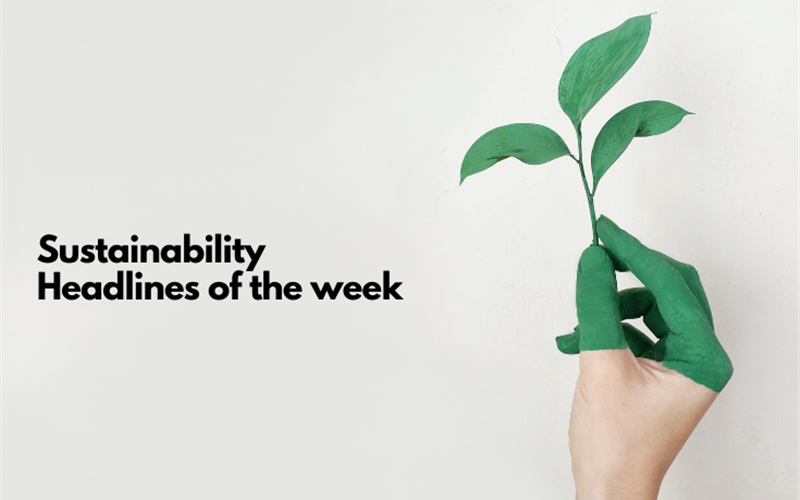UNDP’s waste management; plastic ban in England
WhatPackaging?’s weekly updates on news stories gearing toward a sustainable future.
28 Aug 2021 | By WhatPackaging? Team
UNDP’s plastic waste management programme
As of June 2021, the United Nations Development Programme’s (UNDP) Plastic Waste Management Programme in India has helped to process 83,900-metric tonnes of plastic waste. The ambition is to process or recycle 85,000-metric tonnes of plastic waste and reach 50 plus cities by 2024. In addition, the Programme organises fairs and other mass awareness campaigns, partnering with retail chains like Big Baazar supermarkets. To encourage people to bring plastic waste, stores offer them a mask or a shopping bag in return. Mobile vehicles and folk songs help spread the message in communities. School children learn about proper disposal, and plastic gulaks (bins for plastic waste collection) are installed on school premises for easy access. The initiative contributes to the government of India’s flagship Swachh Bharat mission, geared towards recycling and managing waste, including single-use plastic.
The Central Pollution Control Board estimates that India has a high recycling rate of about 60% for post-consumer plastic waste; however, this is done mostly by the informal sector, which includes Safai Saathis (waste pickers), aggregators and informal recycling units with some help from urban local authorities. A key objective is to help move the sector from informal to formal. So, UNDP has been helping Safai Saathis, who contribute immensely to resource management and yet occupy the lowest rung of the ladder of the circular economy.
According to the Ellen MacArthur Foundation, the circular economy development path in India could create an annual value of Rs 14-lakh crore (USD 218-billion) in 2030 and Rs 40-lakh crore (USD 624-billion) in 2050 in comparison to the current development scenario. It could reduce greenhouse gas emissions by 44% along with significant reduction in air pollution, thus contributing to health and economic benefits for society.
Chennai officials to conduct daily raids on plastics use
A few days after the Greater Chennai Corporation resumed action against the sale and use of one-time plastic items, the civic body instructed sanitary inspectors in city divisions to conduct plastic raids every day and send reports to the headquarters. As per a corporation report, the field officials have seized 1,390-kg of banned plastic items between August 19 and August 25. During the period, 2,773 shops and commercial establishments have been raided and more than Rs 3.23-lakh has been collected as penalty. On 25 August, 700 shops were raided and 313-kg of banned plastic were seized.
Single-use plastic plates, cutlery to be banned in England
Single-use plastic plates and cutlery, and polystyrene cups will be banned in England under government plans, as it seeks to reduce the plastic polluting the environment. A public consultation will launch in the autumn and the ban could be in place in a couple of years. The move was welcomed by campaigners, but they said overall progress on cutting plastic waste was “snail-paced”, with the EU having banned these items and others in July.
The average person uses 18 throwaway plastic plates and 37 single-use knives, forks and spoons each year, according to ministers, while the durability of plastic litter means it kills more than a million birds and 100,000 sea mammals and turtles every year around the world. The government will also impose a plastic packaging tax from April 2022. This will charge 200 pound per tonne for plastic that has less than 30% recycled content, to encourage greater use of recycled material.
The government’s plastic bag charge has cut their use in supermarkets by 95% since 2015, and it banned plastic microbeads in washing products in 2018 and single-use plastic straws, cotton buds and drinks stirrers in 2020. A deposit return scheme for plastic bottles will not be in place in England until late 2024 at the earliest, six years after being announced by the government as a key environmental policy.
Blue Planet launches learning programme on sustainability
Blue Planet Environmental Solutions, a pan-Asian company driving regional sustainability through technology driven and IP-based end-to-end solutions based in Singapore, for waste management and up-cycling, has announced the launch of Blue Nudge, a learning programme on sustainability. Blue Nudge is designed to help participants develop an understanding of sustainability and the curriculum provides a tailored approach and workflow to help both children and youth begin their sustainable journey to inspire change within the community. Topics covered under the programme include tackling food waste, green energy, water conservation, sustainability awareness, recycling, waste management, plastic consumption reduction, green transportation, sustainable diet, community leadership, and engagement amongst others. This wide variety of courses will help learners develop the key skill set to form an informed perspective on these issues and start inculcating incremental changes in the learner’s life.













 See All
See All